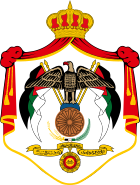| King of the Hashemite Kingdom of Jordan | |
|---|---|
 Arms of His Majesty the King of the Hashemite Kingdom of Jordan Arms of His Majesty the King of the Hashemite Kingdom of Jordan | |
| Incumbent | |
 | |
| Abdullah II since 7 February 1999 | |
| Details | |
| Style | His Majesty |
| Heir apparent | Hussein, Crown Prince of Jordan |
| First monarch | Abdullah I |
| Formation | 25 May 1946; 78 years ago (1946-05-25) |
| Residence | Raghadan Palace (official) Beit Al Urdun Palace (private) |
| Politics of Jordan |
|---|
 |
|
|
| Constitution |
| Monarchy |
|
ExecutiveGovernment
|
|
LegislatureParliament (18th Parliament) Senate House of Representatives |
Judiciary
|
|
Administrative divisions
Local government
|
| Elections |
Foreign relations
|
| Related topics |
|
|
The king of the Hashemite Kingdom of Jordan (Arabic: ملك المملكة الأردنية الهاشمية) is the monarchical head of state of Jordan. He serves as the head of the Jordanian monarchy—the Hashemite dynasty. The king is addressed as His Majesty (صاحب الجلالة).
Jordan is a constitutional monarchy. However, the king is vested with somewhat more executive and legislative power than is typically the case for constitutional monarchs. He is commander-in-chief of the Jordanian Armed Forces and appoints the Prime Minister of Jordan and the directors of security agencies. He also appoints the members of the upper house, the Senate, as well as the members of the Constitutional Court.
The current king, Abdullah II, took the throne on 7 February 1999 following the death of his father, Hussein.
History
Further information: History of JordanThe sons of Hussein bin Ali, the Grand Emir and Sharif of Mecca were set up as the kings of Iraq and Jordan in the aftermath of the Arab Revolt and World War I.
The Jordanian monarchy was set up in 1921, with Abdullah I becoming Emir of the Emirate of Transjordan, a post he held from 11 April 1921 until Transjordan gained independence on 25 May 1946 as the Hashemite Kingdom of Transjordan. Once independence was gained, Abdullah was crowned the country's first monarch. The country's name was shortened to the Hashemite Kingdom of Jordan on 26 April 1949, after the kingdom won control of both sides of the Jordan River as a result of the 1948 Arab–Israeli War.
Succession
Further information: Succession to the Jordanian throneMonarchs of Jordan (1921–present)
Emirate of Transjordan (1921–1946)
| Name | Lifespan | Reign start | Reign end | Notes | Family | Image |
|---|---|---|---|---|---|---|
Abdullah I
| (1882-02-02)2 February 1882 – 20 July 1951(1951-07-20) (aged 69) | 11 April 1921 | 25 May 1946 | Previously King-designate of Iraq for a short period in 1920. Son of Hussein bin Ali | Hashemite |  |
Hashemite Kingdom of Jordan (1946–present)
| Name | Lifespan | Reign start | Reign end | Notes | Family | Image |
|---|---|---|---|---|---|---|
Abdullah I
| (1882-02-02)2 February 1882 – 20 July 1951(1951-07-20) (aged 69) | 25 May 1946 | 20 July 1951 (assassinated) | Proclaimed King of Palestine by the Jericho Conference in 1948 | Hashemite |  |
Talal
| (1909-02-26)26 February 1909 – 7 July 1972(1972-07-07) (aged 63) | 20 July 1951 | 11 August 1952 (abdicated) | Son of Abdullah I | Hashemite |  |
Hussein
| (1935-11-14)14 November 1935 – 7 February 1999(1999-02-07) (aged 63) | 11 August 1952 | 7 February 1999 | Son of Talal | Hashemite |  |
Abdullah II
| (1962-01-30) 30 January 1962 (age 62) | 7 February 1999 | Incumbent | Son of Hussein | Hashemite |  |
Timeline

Royal Standard
See also: Flag of Jordan
See also
- History of Jordan
- Royal Hashemite Court
- Crown Prince of Jordan
- List of Jordanian royal consorts
- List of Sunni dynasties
References
- "Jordan". Freedom in the World. Freedom House. 2019. Retrieved 20 April 2020.
External links
| Kings of Jordan | |||
|---|---|---|---|
 |  | ||
| Jordan articles | |||||
|---|---|---|---|---|---|
| History | |||||
| Geography | |||||
| Politics | |||||
| Economy | |||||
| Society |
| ||||
| People | |||||
| Lists | |||||